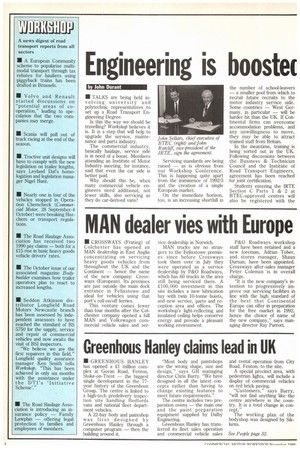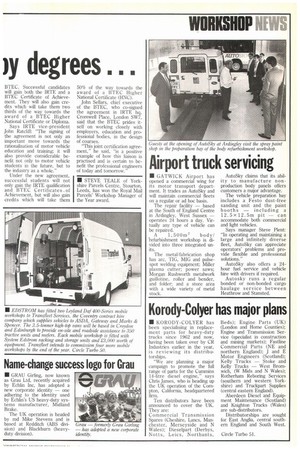Engineering is boost( degrees
Page 122

Page 123

If you've noticed an error in this article please click here to report it so we can fix it.
• TALKS are being held involving university and polytechnic representatives to set up a Road Transport Engineering Degree.
Is this the way we should be travelling? Workshop believes it is. It is a step that will help to upgrade the service, maintenance and parts industry.
The commercial industry, basically haulage, service side is in need of a boost. Members attending an Institute of Motor Industry meeting, for instance, said that even the car side is better paid.
Why should this be, when many commercial vehicle engineers need additional, not fewer skills, also servicing as they do car-derived vans? Servicing standards are being raised — as is obvious from our Workshop Conference. This is happening quite apart from the imminence of 1992/3 and the creation of a single European market.
On the immediate horizon, too, is an increasing shortfall in the number of school-leavers — a smaller pool from which to recruit future recruits to the motor industry service side. Some countries — West Germany, in particular — will be harder hit than the UK. If Continental firms can overcome accommodation problems, and any unwillingness to move, they may be able to attract trained staff from Britain.
In the meantime, training is being sorted out in the UK. Following discussions between the Business & Technician Council and the Institute of Road Transport Engineers, agreement has been reached for joint certification.
Students entering the IRTE Section C Parts 1 & 2 at BTEC-approved centres will also be registered with the BTEC. Successful candidates will gain both the IRTE and a BTEC Certificate of Achievement. They will also gain credits which will take them two thirds of the way towards the award of a BTEC Higher National Certificate or Diploma.
Says IRTE vice-president John Rateliff: "The signing of the agreement is not only an important move towards the rationalisation of motor vehicle education and training; it will also provide considerable benefit not only to motor vehicle students in the future, but to the industry as a whole."
Under the new agreement, successful students will not only gain the IRTE qualification and BTEC Certificates . of Achievement, but will also gain credits which will take them 50% of the way towards the award of a BTEC Higher National Certificate (HNC).
John Sellars, chief executive of the BTEC, who co-signed the agreement in IRTE hq, Cromwell Place, London SW7, said that the BTEC prides itself on working closely with employers, education and professional bodies, in the design of courses.
"This joint certification agreement," he said, "is a positive example of how this liaison is practised and is certain to benefit the professional engineers of today and tomorrow."
• STEVE TEALE of Yorkshire Parcels Centre, Stourton, Leeds, has won the Royal Mail Parcels' Workshop Manager of the Year award.


























































































































































